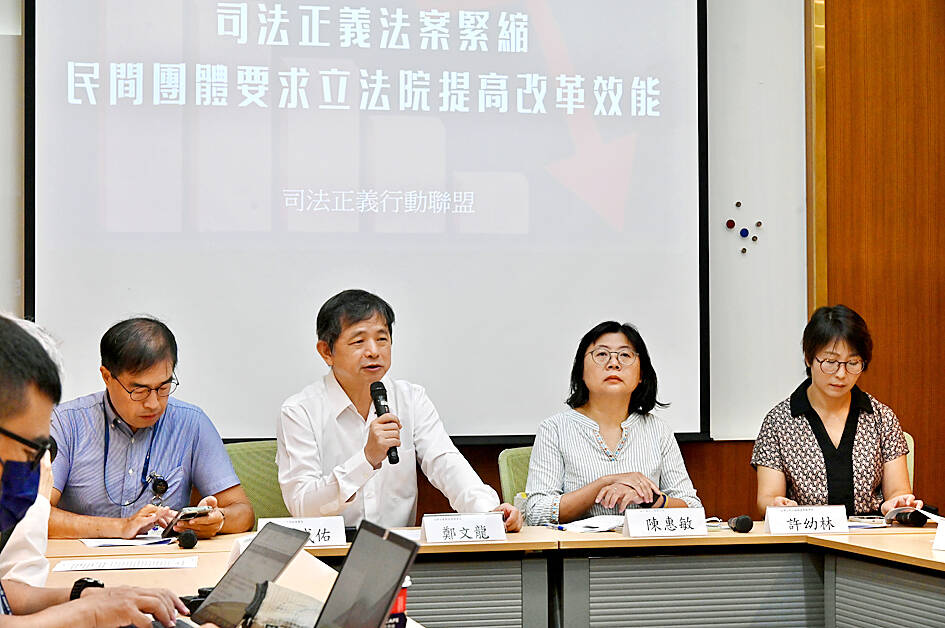Partisan strife was frequent and justice bills were few in the previous legislative session, civil groups said on Thursday, urging the governing and opposition parties to work together to pass what they described as the “10 priority policies and bills,” including a public interest act to protect whistle-blowers.
A justice alliance formed by the Taiwan Jury Association, Prison Watch, Taiwan Civil Liberties Union and other civil groups released its evaluation report on the legislature’s contribution to judicial justice ahead of the beginning of the new legislative session yesterday.
The report said the legislature underperformed, as only 11 bills were relevant to judicial justice in the previous session, much fewer than before.

Photo: George Tsorng, Taipei Times
Most bills that passed the third reading remained the same as the version proposed by the Executive Yuan, indicating that lawmakers are not proactive enough, it added.
The underperformance of the legislature can be linked to the legislative reform bill proposed in the session, which was intended for good, but became a waste of resources due to partisan power struggles, delaying addressing of other urgent judicial challenges, the report said.
However, the reform bill included an amendment to the Criminal Code and the Act Governing the Legislative Yuan’s Power (立法院職權行使法), criminalizing “contempt of the legislature” and requiring the president to reply to lawmakers’ questions immediately after giving an address at the legislature which contradicted the Constitution, it said.
Under the Constitution, the president is not accountable to the legislature, so they do not need to respond to lawmakers, the report said, adding that the amendment should be revised.
The justice alliance also questioned the amendments to the Communication Security and Surveillance Act (通訊保障及監察法), which allow prosecutors to access personal information and network traffic records for investigation purposes, which has caused concerns about invasion of privacy.
The amendments to the Fraud Hazard Prevention Act (詐欺犯罪危害防制條例) also raised human rights concerns, it added.
As such, the alliance proposed 10 judicial policies and bills the legislature can put on top of its agenda for the new session including: abolishing inquiry sessions conducted by prosecutors; amending the State Compensation Act (國家賠償法); establishing a public interest act to protect whistle-blowers; establishing an act in line with the UN’s Convention against Torture and Other Cruel, Inhuman or Degrading Treatment or Punishment; dividing labor between prosecution and policing systems; curbing prosecutors’ abuse of their power to appeal verdicts; amending the Prison Act (監獄行刑法) to protect prisoners’ rights to vote and institute legal proceedings; establishing an act to combat military injustice; and reducing judicial burdens.
Self-inflicted injuries top the list of causes of deaths in the military, with 97 cases over the past five years, the alliance said, citing data from the Audit Office, adding that the government should protect human rights in the military.
From the restriction of personal freedom to inappropriate police interrogation, torture comes in different forms and puts people at risk of inhuman treatment, Taiwan Jury Association founder Jerry Cheng (鄭文龍) said, calling for the establishment of an act against torture and other cruel treatment.
A public interest act to protect whistle-blowers is needed as well to prevent unlawful deeds inside government agencies and the private sector, he said, adding that the ruling and opposition parties should respect each other and negotiate the priority policies and bills.

An essay competition jointly organized by a local writing society and a publisher affiliated with the Chinese Communist Party (CCP) might have contravened the Act Governing Relations Between the People of the Taiwan Area and the Mainland Area (臺灣地區與大陸地區人民關係條例), the Mainland Affairs Council (MAC) said on Thursday. “In this case, the partner organization is clearly an agency under the CCP’s Fujian Provincial Committee,” MAC Deputy Minister and spokesperson Liang Wen-chieh (梁文傑) said at a news briefing in Taipei. “It also involves bringing Taiwanese students to China with all-expenses-paid arrangements to attend award ceremonies and camps,” Liang said. Those two “characteristics” are typically sufficient

A magnitude 5.9 earthquake that struck about 33km off the coast of Hualien City was the "main shock" in a series of quakes in the area, with aftershocks expected over the next three days, the Central Weather Administration (CWA) said yesterday. Prior to the magnitude 5.9 quake shaking most of Taiwan at 6:53pm yesterday, six other earthquakes stronger than a magnitude of 4, starting with a magnitude 5.5 quake at 6:09pm, occurred in the area. CWA Seismological Center Director Wu Chien-fu (吳健富) confirmed that the quakes were all part of the same series and that the magnitude 5.5 temblor was

The brilliant blue waters, thick foliage and bucolic atmosphere on this seemingly idyllic archipelago deep in the Pacific Ocean belie the key role it now plays in a titanic geopolitical struggle. Palau is again on the front line as China, and the US and its allies prepare their forces in an intensifying contest for control over the Asia-Pacific region. The democratic nation of just 17,000 people hosts US-controlled airstrips and soon-to-be-completed radar installations that the US military describes as “critical” to monitoring vast swathes of water and airspace. It is also a key piece of the second island chain, a string of

The Central Weather Administration has issued a heat alert for southeastern Taiwan, warning of temperatures as high as 36°C today, while alerting some coastal areas of strong winds later in the day. Kaohsiung’s Neimen District (內門) and Pingtung County’s Neipu Township (內埔) are under an orange heat alert, which warns of temperatures as high as 36°C for three consecutive days, the CWA said, citing southwest winds. The heat would also extend to Tainan’s Nansi (楠西) and Yujing (玉井) districts, as well as Pingtung’s Gaoshu (高樹), Yanpu (鹽埔) and Majia (瑪家) townships, it said, forecasting highs of up to 36°C in those areas